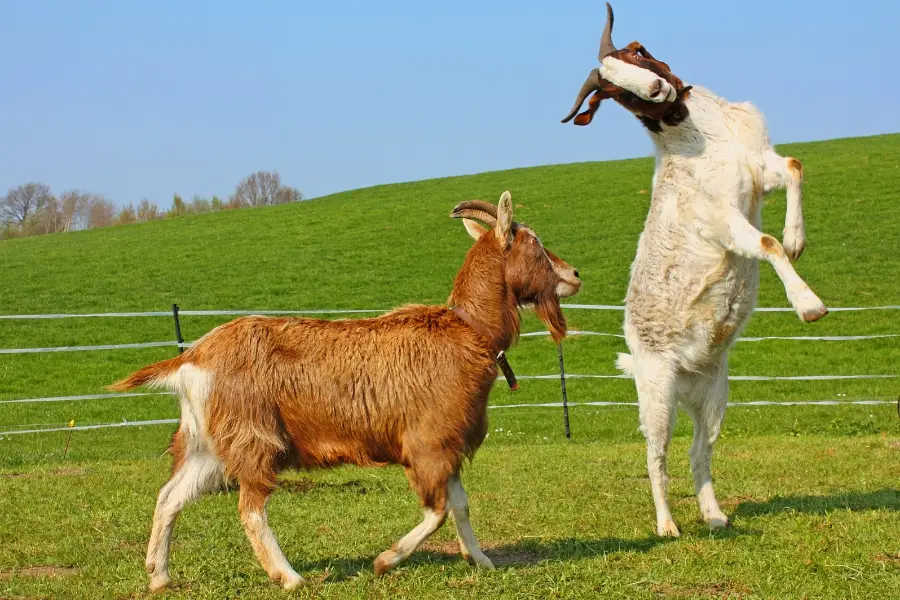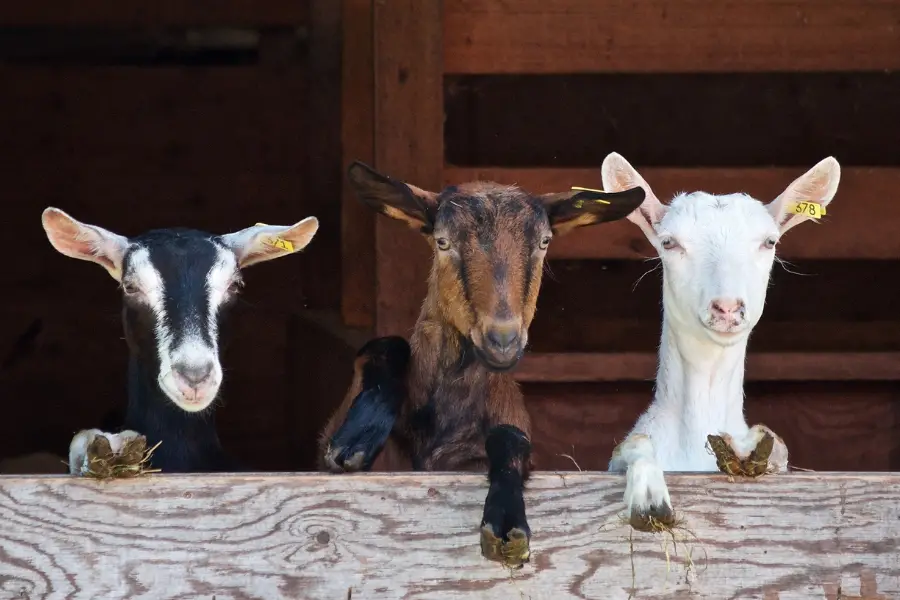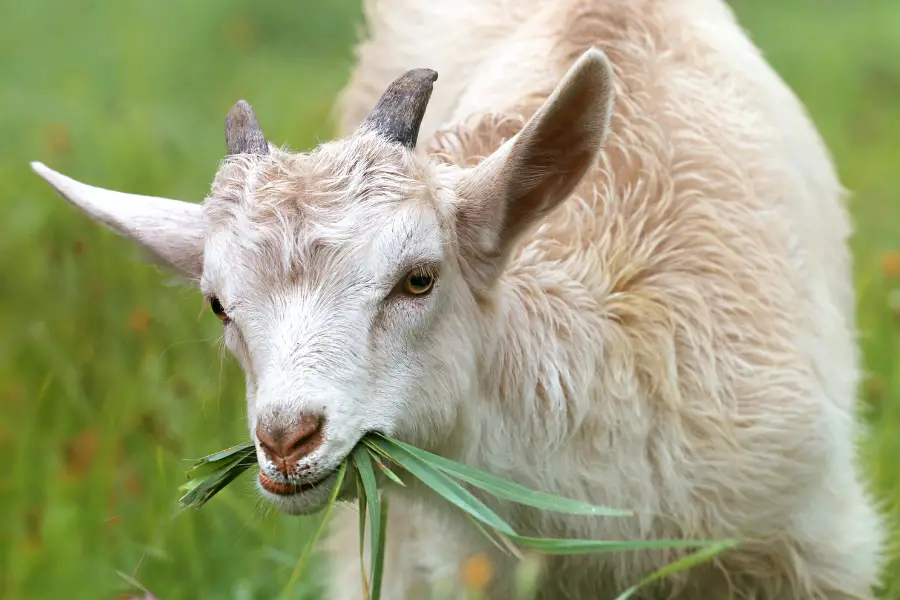
Goats are known for their incredible ability to eat a wide variety of plants, making them excellent browsers, grazers, and an environmentally friendly option for controlling weeds and brush in pastures or homesteads. However, a common misconception is that goats will inherently know what plants are safe to consume. The truth is, goats may not always instinctively avoid toxic plants, and it is up to their caretakers to provide them with a healthy and safe diet.
Table of contents
Do Goats Know What Not To Eat: An Overview
Understanding the dietary needs of goats is essential for their health and wellbeing. Goats require a balanced diet that provides sufficient protein, energy, fat, minerals, and vitamins to maintain overall health, support growth, and maximize milk production. Typically, the primary component of a goat’s diet is forage, which includes grasses, hay, and shrubs. Supplemental feed can sometimes be necessary to ensure proper nutrition, particularly in certain life stages or when there is limited access to high-quality forage.
In addition to their regular diet, it is important to know which treats and snacks are safe for goats and which are potentially dangerous or toxic. Some plants and fruits can cause serious health issues if consumed by goats, and it is crucial for goat owners to be aware of these hazards as well as the importance of providing quality feed at all times.
Key Takeaways
- Goats may not instinctively avoid toxic plants, making it essential for caretakers to provide a safe and healthy diet.
- A balanced goat diet includes sufficient protein, energy, fat, minerals, and vitamins, primarily from forage, with supplemental feed when needed.
- Be aware of the difference between safe treats and snacks and potentially dangerous foods for goats to ensure their wellbeing.
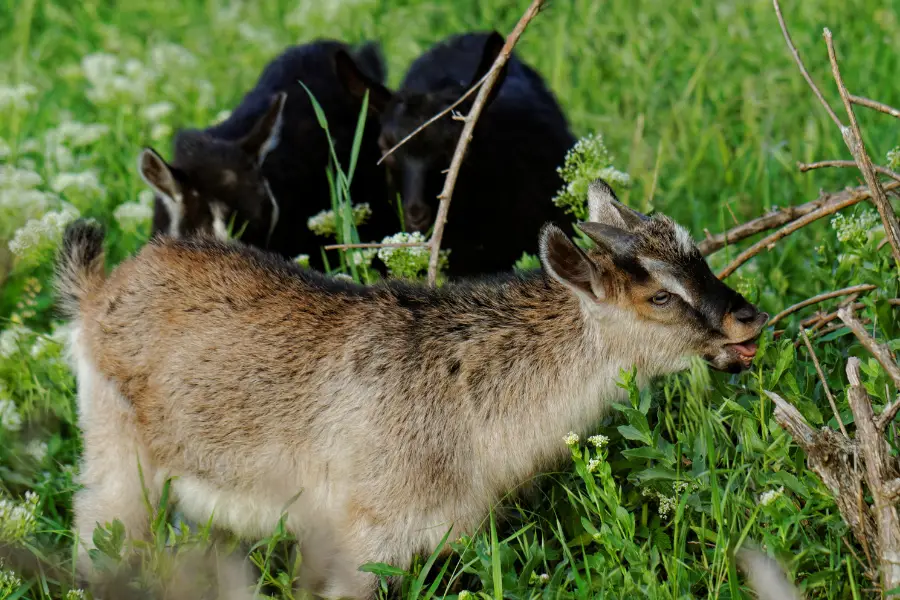
Understanding Goats’ Dietary Needs
Goats are known to be adaptable and versatile in their eating habits, but there are essential nutrients they need to maintain their health. The main components of a goat’s diet include protein, energy, minerals, vitamins, and water.
Protein is essential for growth, development, and reproduction. Sources of protein for goats can be hay, alfalfa, or commercial feeds with the proper protein content. The nutrient requirements of a goat vary depending on factors such as age, gender, and whether they are pregnant or lactating. Goats require adequate energy intake, which they usually get from carbohydrates and fats in their diet. This energy is necessary for maintenance, growth, and production of milk and fiber.
Minerals and vitamins are critical for maintaining a goat’s overall health. These nutrients are required in small amounts and can be found in feeds, forages, or supplements. Calcium and phosphorus are vital for bone development, while minerals like copper and selenium are necessary for various bodily functions. Vitamins A, D, and E are essential for immune health, growth and metabolism, and reproduction, respectively.
Water is also crucial for goats, as they need constant access to clean, fresh water to maintain proper hydration. A goat’s water requirements can differ depending on factors such as climate, activity level, and health status. Ensuring that your goats have consistent access to fresh water will help them stay healthy and avoid dehydration.
It is essential to understand that goats have unique dietary needs, and providing them with the right balance of nutrients is crucial for their well-being. Consult a Goat Feed: Your 5-Minute Guide to learn more about the best feed options and smart tips on feeding your goats effectively and efficiently.
Different Types of Feed for Goats
Goats are known for their exceptional ability to browse and graze on various types of foliage, which is important for their overall health and well-being. Their diet can be diverse and typically includes grass, hay, and grain.
Grass is a common forage option found in pastures for goats. They graze on it and obtain essential nutrients. However, their preference is for twigs, leaves, shrubbery, and bark, over grass.
Hay is an essential part of a goat’s diet, particularly when they cannot graze or forage. It can be alfalfa or grass hay, both providing the necessary fiber and roughage. Feeding alfalfa hay, which is high in protein, can be beneficial for a goat’s health and growth. Best Goat Feeder offers more information on optimal feeding of hay to goats.
Grain can be included in a goat’s diet but should be fed with caution, as overfeeding may result in health issues like bloat. Grain feed should be a small part—if at all—of the goat’s diet. Whole grains or roll grains are healthier options compared to finely ground grains. Pelleted grain is another option, which can be useful in providing additional nutrients when hay or pasture is not sufficient.
In conclusion, providing a balanced diet for goats is crucial to maintaining their health and well-being. Offering them a variety of feed options like grass, hay, and grain in appropriate amounts helps them to thrive. It’s important, however, to monitor their consumption and adjust their diet as needed to prevent health issues, such as bloat.
Treats and Snacks for Goats
Goats have diverse tastes, and providing them with occasional treats and snacks not only make them happy but can also supplement their nutritional intake. However, it’s important to note that the primary diet of goats should consist of hay, and treats should only be given in moderation.
Fruits like apples, bananas, pears, and watermelon are healthy treats for goats. They are rich in crucial nutrients and can make for enjoyable snacks. For instance, banana peels are high in magnesium, potassium, and vitamin B12, while apples provide fiber and vitamins. When offering these treats to goats, make sure to remove any seeds, as they can be harmful.
Vegetables such as carrots and pumpkin are also suitable for your goats. Carrots are rich in beta-carotene, which contributes to healthy coat and eyesight, while pumpkins provide valuable vitamins and minerals. Be cautious when feeding them leafy vegetables like spinach and kale, as they may contain high amounts of oxalates that can be toxic in excessive quantities.
A popular treat option among goat owners is sweet feed. Sweet feed is made primarily of grains and can be a source of quick energy for your goats. However, it should be limited in their diet as an overconsumption of grains can lead to health issues like bloat.
In summary, when offering treats and snacks to your goats, remember to:
- Give treats in moderation.
- Remove any seeds from fruits.
- Introduce new treats slowly to ensure your goats can digest them well.
- Monitor the goats’ overall health and adjust the quantity of treats accordingly.
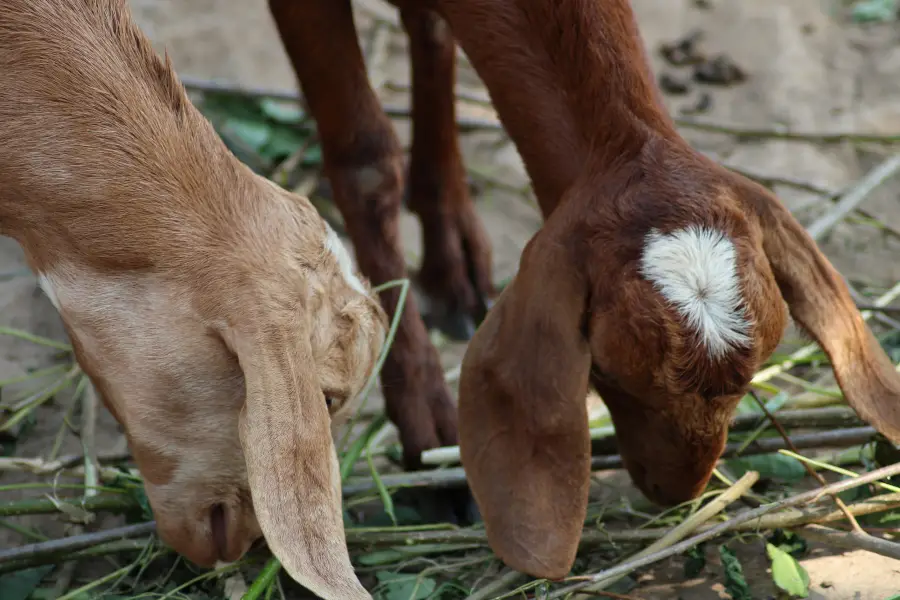
Dangerous Foods for Goats
Goats are known for their ability to consume a wide variety of plants, but there are certain foods that can be harmful to them.
Goats will not always recognize and avoid toxic and harmful plants. Understanding these dangerous foods and keeping them away from goats can prevent potential health issues.
Oleander and azaleas are toxic plants that can pose serious health risks to goats. These plants contain compounds that can affect the heart and cause symptoms ranging from vomiting to sudden death. Similarly, rhododendrons contain substances that can be fatal if ingested by goats.
Poison hemlock and water hemlock are extremely toxic plants that can cause nervous system damage and lead to seizures, coma, or death in goats. Consumption of even small amounts of these plants can be fatal, so it is essential to keep goats away from areas where they might be present.
Cherries and peaches, specifically their pits, leaves, and stems, contain cyanide-producing compounds that can cause respiratory distress and death in goats when consumed in large quantities. Similarly, yew and chokecherry are highly toxic and can lead to severe gastrointestinal issues or even death.
Boxwood is another plant that should be avoided as it contains compounds that can cause gastrointestinal upset, heart problems, and even death in goats. Additionally, kale should be limited in a goat’s diet as its high calcium content can lead to urinary calculi, especially in male goats.
Some common foods that are toxic to goats include avocados and potatoes. Avocados contain a toxin called persin, which can cause gastrointestinal problems and even heart failure, while potatoes, specifically their leaves and stems, contain solanine, a toxin that can cause severe gastrointestinal problems and central nervous system issues when consumed.
In summary, it is crucial to be aware of the potentially toxic plants and foods for goats and ensure that they do not have access to these dangerous substances. Proper management of their dietary intake can help ensure a healthy and safe environment for these animals.
The Importance of Quality Feed
Providing goats with quality feed is crucial for their overall health and productivity. A balanced diet containing the right proportions of essential nutrients allows goats to maintain optimal growth, reproduction, and milk production rates. The primary components of a goat’s diet include high-quality forage, appropriate protein sources, minerals, vitamins, and water.
Forage plays a significant role in a goat’s diet, mainly because they are natural browsers and grazers. Alfalfa, clover, and weeds are beneficial options, as they contain essential vitamins, minerals, and proteins. However, it is important to avoid toxic plants. Timothy hay is another valuable source of fiber, while chaffhaye is a fermented forage option rich in both protein and digestible fiber.
Protein is necessary for muscle growth, maintenance, and overall health. Alfalfa, for instance, boasts high protein content, making it a suitable supplement for goats with higher protein needs. On the other hand, clover provides essential amino acids that support the goats’ metabolism and immune system.
Minerals play a significant role in maintaining proper body functions, such as bone formation and nerve impulse transmission. Offering goats a mineral supplement ensures they receive the necessary calcium, phosphorus, magnesium, and other essential trace elements.
Vitamins are another vital component of a goat’s diet, as they aid in metabolic and physiological functions. For example, vitamin A is essential for vision and growth, while vitamin E supports the immune system and reproduction process.
A well-balanced goat diet also includes energy sources, such as carbohydrates and fats, required for daily activities and maintaining body condition. Carbohydrates provide quick energy for them, while fats serve as a long-term energy reserve.
Lastly, it’s crucial to provide goats with clean and fresh water daily. Adequate water intake is vital to the animals’ digestion and overall well-being, as it aids in nutrient absorption and maintaining hydration.
In conclusion, providing goats with high-quality feed is essential for their overall health and productivity. Ensuring the right balance of forage, protein, vitamins, minerals, energy sources, and water allows them to maintain optimal growth, reproduction, and milk production rates.
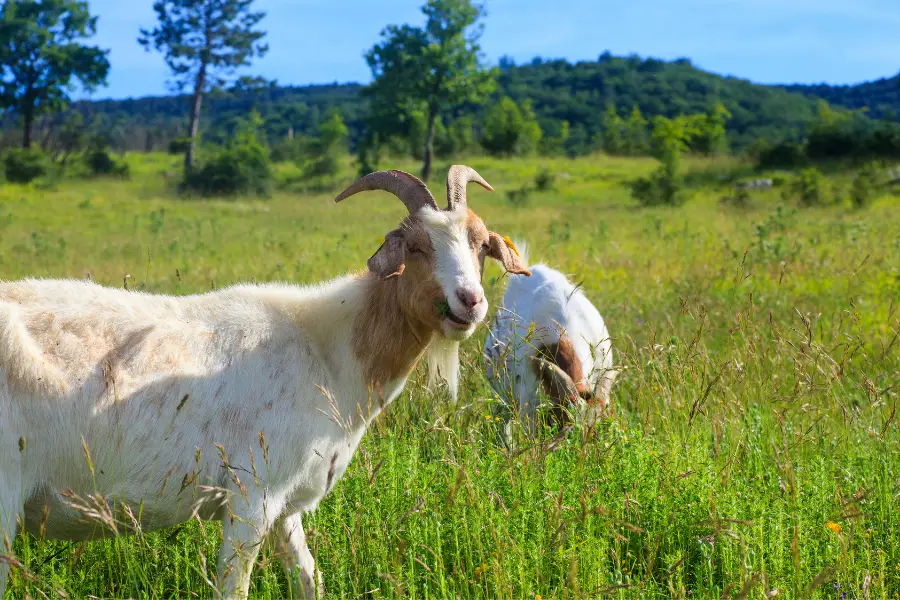
Frequently Asked Questions
Are goats able to recognize toxic plants?
Goats possess an innate ability to recognize and avoid many toxic plants. However, this ability is not foolproof, and goats may still consume harmful plants under certain circumstances, such as when they are extremely hungry or when the plants are mixed in with other forage.
Which fruits and vegetables are unsafe for goats?
Some fruits and vegetables that are unsafe for goats include avocados, cherry pits, and potatoes. Chocolate is also toxic to goats. Keep in mind that this is not an exhaustive list, and it is essential to research each food item before offering it to your goat.
What are common poisonous plants for goats?
There are over 700 species of plants in the United States that pose a risk to ruminants like goats. Some common toxic plants include bracken fern, milkweed, oleander, and rhododendron. It is crucial to familiarize yourself with the plants native to your area and ensure that your goats do not have access to these poisonous plants.
What should never be fed to a goat?
Goats should never be fed finely ground grains, meat, avocados, cherry pits, potatoes, and chocolate. Additionally, they should not consume synthetic or artificial materials such as rubber, metal, or fabric, as this can lead to severe health issues and pain.
Can goats consume human food, and if so, which types?
Goats can consume some human foods in moderation, such as fruits, vegetables, and grains. However, it is essential to verify that the food is safe for goat consumption. Avoid feeding them processed food or anything containing toxic ingredients, such as chocolate, avocado, or cherry pits.
Is there any truth to goats eating everything?
The notion that goats eat everything, including tin cans, is a myth. Goats are curious animals and often use their mouth and lips to explore their surroundings. While they may not eat everything, it is essential to provide them with a balanced and appropriate diet to maintain their health and well-being.
Video: Do Goats Eat Everything?
The first half of this excellent video will address several common questions regarding how goats eat and what they eat.


